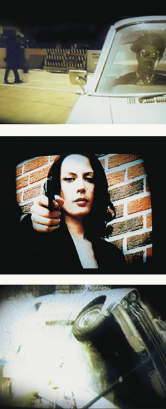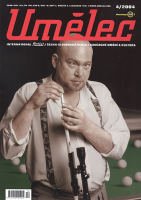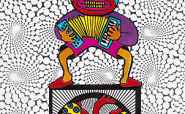| Umělec 2004/4 >> Estelle Artus, Daughter of Video | Просмотр всех номеров | ||||||||||||
|
|||||||||||||
Estelle Artus, Daughter of VideoUmělec 2004/401.04.2004 Alexis Leung | profile | en cs |
|||||||||||||
|
The first thing one notices in the video work of Estelle Artus is the presence of images containing fragments of familiar films, soundtracks or dialogues; it isn’t important whether or not we recognize them. The reference remains at a distance, often ironic, always light; and the artist’s videos can be fully appreciated even if the spectator doesn’t know the origins of a film in which only the atmosphere is evident. Estelle Artus says that it is unimportant for her whether the films she used are identifiable out of the context of her works.
More than film as an object of recognition and cultural integration, she is interested in the emotion of the instant, of the scene. Specific atmospheres, plans and sometimes little more than a fragment of dialogue is sufficient to make such a work. In selecting these cinematographic elements, replaying them, integrating them or introducing them in parts into a new visual work, there is somehow a Proustian desire to find one particular instant augmented by a phantasm from memory—certainly an illusory desire, but one that is always conscious of its own limits, and never sterile. In effect, the creative act brings out apparently tautological movement from its impotence by proposing a new incarnation of an image. Understandably, the role of the artist becomes an issue. In the completely different field of Rap and Techno music, the phenomenon of sampling is well-known and often appears in contemporary artistic creation. But even if reference to a single artist is lost at once because of sampling and the intervention of multiple collaborators, the conditions of this plurality of artists or collaborators often remains to be defined. By inviting a third party to select a film to be subsequently manipulated, recorded and distributed in the name of a collective, Artus integrates multiple identities into her work, placing presuppositions about the artist-source relationship into question. As with Oldendorf, Gordon or Huyghe, she deliberately delegates her work, presenting images in which the artist and object are always on the boundary of recognition. Thus the interplay of exchange and circulation, in which the artist ultimately establishes the traces of the work, takes part fully in her work. Cinematic elements are selected and subsequently recorded, as she incorporates fragments as a single visual work. This process also reflects a desire to offer experiences that were entirely unique and yet detached from any specific subjective narrative. (Even here this is an illusory aspiration, that remains conscious of ones own borders and never sterile. The creative act is left in this movement its paradox). In both her films and video installations, Estelle Artus questions the identity of her actors, but she remains deliberately in an indefinable, strange and obscene space. She trifles with sexual stereotypes and codes of representation. Symbols of power and identity are in this sense put directly under scrutiny by the bodies and by games with the archetypal figures of fiction. Women speak with male voices (Soissons-New York), girls break down in hotel halls (I Love Korea and Korea Loves Me), and under the bullets of passionate soldiers (Play Again), men dance naked after a poker game (Domestic Underground). These scenes depict places of transit, derelict, awkward—that from which the human emerges. I conclude with an essential aspect in this young artist: humor. The films of Estelle Artus astonish, disturb but above all, call forth laughter. The artist looks after her audience and with no indulging, she offers up unforgettable scenes like the one in which a young girl falls with disarming glamor and refuses to die (Play Again) or of a woman who aims her revolver with the detachment of a Clint Eastwood (Soisson-New York). These are unforgettable scenes. They are of those that are good to recollect when life weighs down, when one would be grateful for a similar magic, grace and aptitude to play with the unexpected.
01.04.2004
Рекомендуемые статьи
|
|||||||||||||








Комментарии
Статья не была прокомментированаДобавить новый комментарий